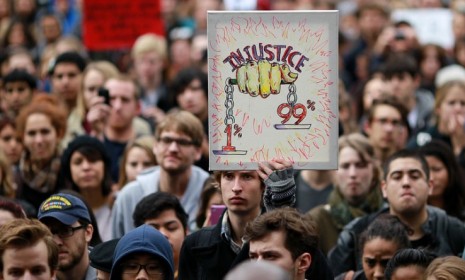The American nightmare: What happened to economic mobility in the U.S.?
America prides itself as a land of economic opportunity. But, when Canadians have better odds of improving their lives, some say that notion has become a myth

A free daily email with the biggest news stories of the day – and the best features from TheWeek.com
You are now subscribed
Your newsletter sign-up was successful
"If you work hard and play by the rules, you ought to have a decent life and a chance for your children to have a better one," President Bill Clinton once famously declared. Yet America is no longer the best place for those born poor to live out the American Dream. According to some studies, Canada, Japan, New Zealand, Singapore and much of Western Europe offer their citizens a much higher degree of economic mobility. The impoverished in the U.S., on the other hand, are more likely to stay poor, while rich Americans stay rich — bad news for a country grounded in a much-vaunted "classless" society and one of presidential hopeful Rick Santorum's talking points on the campaign trail. Is economic mobility in the U.S. a myth?
Yes. The U.S. is no longer the land of economic opportunity: "A nation that prides itself on its lack of class rigidity has, in short, become significantly more economically rigid than other developed countries," says Timothy Noah at The New Republic. In Canada, for example, someone born in the bottom tenth of the income scale has a 16 percent chance of remaining there. In the U.S., it's 22 percent. The comparison is "particularly striking" since the U.S. is a far richer country. One theory is that income inequality is so great in the U.S., that it's hard to move from one class to the other. "As the ladder's rungs grow farther apart, the ladder becomes more difficult to climb."
The Week
Escape your echo chamber. Get the facts behind the news, plus analysis from multiple perspectives.

Sign up for The Week's Free Newsletters
From our morning news briefing to a weekly Good News Newsletter, get the best of The Week delivered directly to your inbox.
From our morning news briefing to a weekly Good News Newsletter, get the best of The Week delivered directly to your inbox.
Costly education plays a big role: Many factors contribute to the problem, says Jason DeParle at The New York Times. More poor Americans grow up with single mothers than their foreign counterparts and the U.S. also has a higher rate of incarceration. But the steep cost of college is a key problem. In an economy where better educated workers get paid considerably more, the price of college "favors the children of the educated and affluent, who have access to better schools and arrive in them more prepared to learn." Economic opportunity is practically a "civil religion" in the U.S., but the data "turns conventional wisdom on its head."
"Harder for Americans to rise from lower rungs"
Nonsense. Economic mobility is alive and well: All this talk of decreased economic mobility is "bunk, tendentious bunk," says Diana Furchtgott-Roth at RealClearMarkets. For one thing, absolute mobility in the U.S. has risen, meaning everyone — from the poorest to the richest — saw their incomes rise in the past 25 years. Furthermore, many studies showing shrinking economic mobility often give "too much weight to the 2007-2009 recession and the subsequent sluggish job growth that has persisted." It's not accurate to distort statistics with one "slice of the business cycle."
"Is economic mobility in the U.S. dead?"
A free daily email with the biggest news stories of the day – and the best features from TheWeek.com
-
 At least 8 dead in California’s deadliest avalanche
At least 8 dead in California’s deadliest avalancheSpeed Read The avalanche near Lake Tahoe was the deadliest in modern California history and the worst in the US since 1981
-
 Political cartoons for February 19
Political cartoons for February 19Cartoons Thursday’s political cartoons include a suspicious package, a piece of the cake, and more
-
 The Gallivant: style and charm steps from Camber Sands
The Gallivant: style and charm steps from Camber SandsThe Week Recommends Nestled behind the dunes, this luxury hotel is a great place to hunker down and get cosy